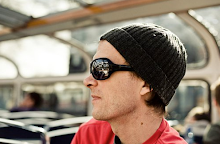I was clinically diagnosed with the disease after a scan revealed the two original tumors. I’ve had scans to check on the growth of the tumor and to map out the location in preparation of surgery. In one case, I had an emergency scan because I thought my brain was exploding (check the archives for that gem).
One of the treats that come with an NF2 diagnosis is the lifetime need for an annual MRI scan. Because NF2 tumors are nerve-based, they can pop up essentially anywhere in the body, so there is a need for constant monitoring. My situation calls for brain and spinal scans. Because the tumors are considered 'slow-growing' — an annual MRI is the norm for keeping things in-check.
Having to lay completely still in a two-foot wide tube for 45 minutes seems like it would be the most difficult aspect of the process, but it’s not. I actually don’t mind the scan itself, I’ve taught myself to relax to a point of a meditative-like state during the scan - just hovering above falling asleep.
The most difficult part of the MRI scan is having to once again make the appointment year after year, wait for the day to arrive and then wait for the results. In my experience, 75% of the results were bad news. You get obsessed with micro-measurement.
“The tumor grew 0.1 centimeter!”
I don’t really even know what 0.1 centimeter amounts to in the real world, I don’t think it’s a lot, a tick mark on a ruler —but because your head is packed pretty tightly with brains and nerves and stuff, those little 0.1 cm increases eventually add up and cause bad things to happen along with a shitload of anxiety.
As anyone who has ever had any sort of health testing done, he time in-between the test and getting the results is the most difficult part.
When working with my original doctor, the results would take a few days and he would follow up with a phone call. I would be on-edge every time the phone would ring. If I didn’t recognize the number, I would let it go to voice-mail. I preferred the results were left on my voice mail, so I could listen to them a few times and make sure I understood everything.
My current doctor emails the results as opposed to calling (obviously). But the rules still apply; I jump every time the phone vibrates with an email alert. Since the scan is now done within the hospital, the results usually get turned around within 24 hours – which cuts down on my post-scan anxiety.
My anxiety was short-lived this year because I received this piece of ‘good news’ last night:
I finally got the reads back
Both sides have a very slight change in the enhancement pattern*, but no significant change in size
So good news and we continue to watch
The spine is good
*When they remove these tumors, it’s very difficult to remove ALL of them. In my case, the ‘enhancement patterns’ refers to residual tumor left behind in an effort not to damage the facial nerve.
Woohoo! No significant change in size!
Here’s to flipping that 75% from bad to good in the next few years and reducing some of that nasty week-ruining anxiety that comes along with it all.


